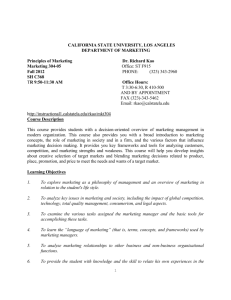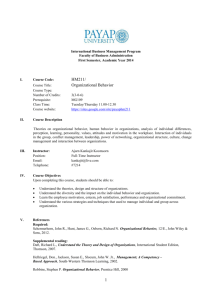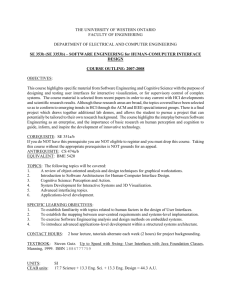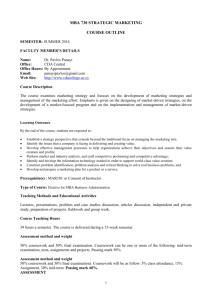Course Outline
advertisement
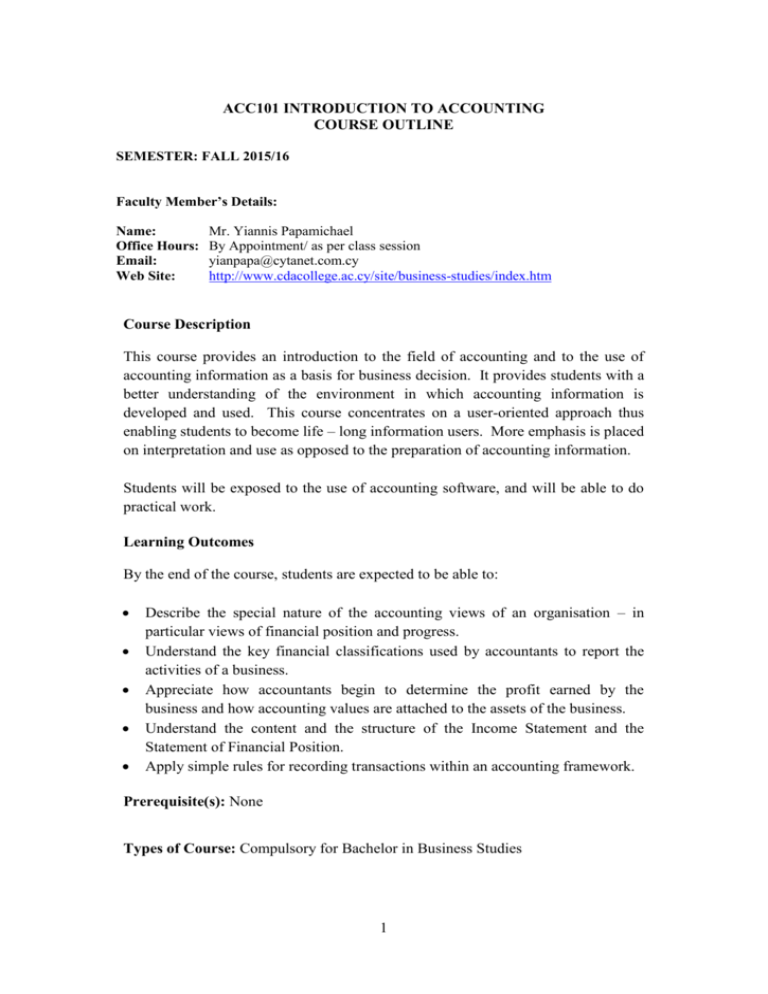
ACC101 INTRODUCTION TO ACCOUNTING COURSE OUTLINE SEMESTER: FALL 2015/16 Faculty Member’s Details: Name: Office Hours: Email: Web Site: Mr. Yiannis Papamichael By Appointment/ as per class session yianpapa@cytanet.com.cy http://www.cdacollege.ac.cy/site/business-studies/index.htm Course Description This course provides an introduction to the field of accounting and to the use of accounting information as a basis for business decision. It provides students with a better understanding of the environment in which accounting information is developed and used. This course concentrates on a user-oriented approach thus enabling students to become life – long information users. More emphasis is placed on interpretation and use as opposed to the preparation of accounting information. Students will be exposed to the use of accounting software, and will be able to do practical work. Learning Outcomes By the end of the course, students are expected to be able to: Describe the special nature of the accounting views of an organisation – in particular views of financial position and progress. Understand the key financial classifications used by accountants to report the activities of a business. Appreciate how accountants begin to determine the profit earned by the business and how accounting values are attached to the assets of the business. Understand the content and the structure of the Income Statement and the Statement of Financial Position. Apply simple rules for recording transactions within an accounting framework. Prerequisite(s): None Types of Course: Compulsory for Bachelor in Business Studies 1 Teaching Methods and Educational Activities Lectures, presentations, problem and case studies discussion, articles discussion, independent and private study, preparation of projects, fieldwork and individual work. Course Teaching Hours 39 hours a semester. The course is delivered during a 13-week semester. Assessment method and weight 50% coursework and 50% final examination. Coursework can be one or more of the following: mid – term examination, tests, assignments and projects. Passing mark 50%. Assessment Class Participation/Tests: Assignments/Case Studies: Mid-term examination: Final examination: 10% 10% 30% 50% Assignments: The students will be assigned to carry out a theoretical research/task in the existing Accounting text over the topics covered in the course outline, or to carry out an exercise using the Internet. The faculty member will determine the character of the assignment. The students are requested to deliver their assignments on an individual or group basis and on time-based on specific instructions supplied. Although collaboration among the students for the preparation of the assignments is encouraged, students should avoid copying/plagiarism. Presentations of results and discussions over the assignments will follow, based on specific instructions. Mid-term examination: The mid-term examination will be of two hours. It will consist of Accounting Exercises and Theory, the topics and level, of which, have been covered according to the learning outcomes timetable. Final Examination: The final examination will be of two hours. It will be comprehensive and it will test the students on the material covered during the semester. Business Administration Grading System % Grade Grade 90-100 80-89 75-79 65-74 60-64 55-59 50-54 Below 50 A B+ B C+ C D+ D F Grade Meaning Grade Points per Credit Excellent 4.00 Very Good 3.50 Good 3.00 Above Average 2.50 Average 2.00 Below Average 1.50 Poor 1.00 Failure 0.00 2 Required Textbook Title: Author(s): Publisher: Edition: Year: ISBN: Accounting: The Basis for Business Decisions Robert F. Meigs McGraw-Hill 8th 1990 0-07-041689-3 Additional Reading, Textbooks, References, Other Bibliography Walter B. Meigs : Accounting: The Basics for Business Decisions Robert F Meigs McGraw Hill Frank Wood : Business Accounting Vol.1 Longman Alan Pizzey : Accounting and Finance Holt, Rinehart and Winston LEARNING OUTCOMES TABLE/TABLE OF CONTENTS Week s 1 2 3-4 5 Learning Outcomes and Content of the Course Introduction to Accounting The purpose of accounting, The financial reporting process, financial statements, and the function of an accounting system, The nature of accounting principles, Organisations influencing accounting practice, Financial Statements, Statement of Financial Position - the effects of business transaction on the accounting Equation Business Organisations Forms of business organisations, Sole proprietorships, Partnerships, Corporation. The use of financial statements by outsiders. Recording Changes in Financial Position The double – entry basis of recording economic transaction and events, and the concepts, conventions and principles associated with this technique, the application of book-keeping to the transaction of business organisation, especially the methods of recording, accounting classification, balancing of accounts and financial statements preparation emphasizing the kinds of information presented in each. Journal Entries The purpose of journal entries in relationship to the ledger and to record common business transaction by posting information from the journal to the ledger accounts. Trial balance, use and limitations. Measuring Business Income. 3 6–7 Recording Changes in Financial Position Preparing a ‘set’ of Financial Statements, Statement of Financial Position, Income Statement, Statement of owner’s equity, and the relationship amongst them, closing the temporary accounts. 8 Completion of the Accounting Cycle Accounting periods and financial statements transactions affecting more than one accounting period, characteristics of adjusting entries, apportioning recorded costs, unearned revenue, unrecorded expenses, unrecorded revenue, preparation and use of the work sheet. 9 The Control of Cash Transactions Reporting cash in the Statement of Financial Position, Statements of cash flows Management Responsibilities relating to cash, cash balances and corporate dividends, internal control over cash, cash balances and corporate dividends, internal control over cash, cash management: the need and preparation of bank reconciliation statements. 10 11 Mid Term Examination Accounts Receivables Prepare estimates of uncollectible accounts receivable, write off any accounts known to be uncollectible and record any later recoveries. Compare the allowance method and the direct write–off method of accounting for uncollectible accounts. Identify ways of converting receivables quickly into cash such as factoring. Computation of the accounts receivable turnover rate. Explain the importance of the ratio. Notes Receivables Examine the characteristics of promissory notes and the nature of interest. Accounting for notes receivable. 11 12 Cash: Plant and Equipment, Depreciation and Intangible Assets Determine the cost of tangible assets, distinguish between capital expenditure and revenue expenditures, explanation of the relationship between depreciation and the matching principle, various methods of calculating depreciation such as straight line, units-of-output, declining balance, and sum-of-the-years’ digits, record of a plan asset. 13 Revision for the Final examinations 4 OTHER INFORMATION: Class attendance: Students are expected to attend the classes regularly and be punctual. Regular checks will take place for execution of homework and other independent studiesassignments-aided towards the understanding of key learning outcomes. Office hours: Students are encouraged and advised to visit regularly their instructor during the office hours (by appointment) and discuss promptly any issues that seem to be important for students ‘welfare’, understanding of course material or other issues that deem to be important for the completion of the course. Humane matters: Inform your faculty member for any un-expectancies that may occur, thus not allowing you to carry out your responsibilities and be promptly in class lessons. Library: You are advised to visit regularly the library of our College and read articles published in academic journals. I recommend you studying regularly among others, English articles of your interest, as a means of improving your understanding of English language and skills, as well as, discussing/expressing views (during class discussions) on current economic/financial/accounting trends and worldwide developments. IMPORTANT NOTES: Class attendance and participation in class activities (with all that is precluded), is expected and absences will affect your final grade. The due dates for assignments/projects/case studies are non-negotiable and late work will be penalized. All assignments/homework/case studies are to be ‘up to bachelor level’ in appearance and structure based on strict guidelines and specifications supplied by the instructor. 5
